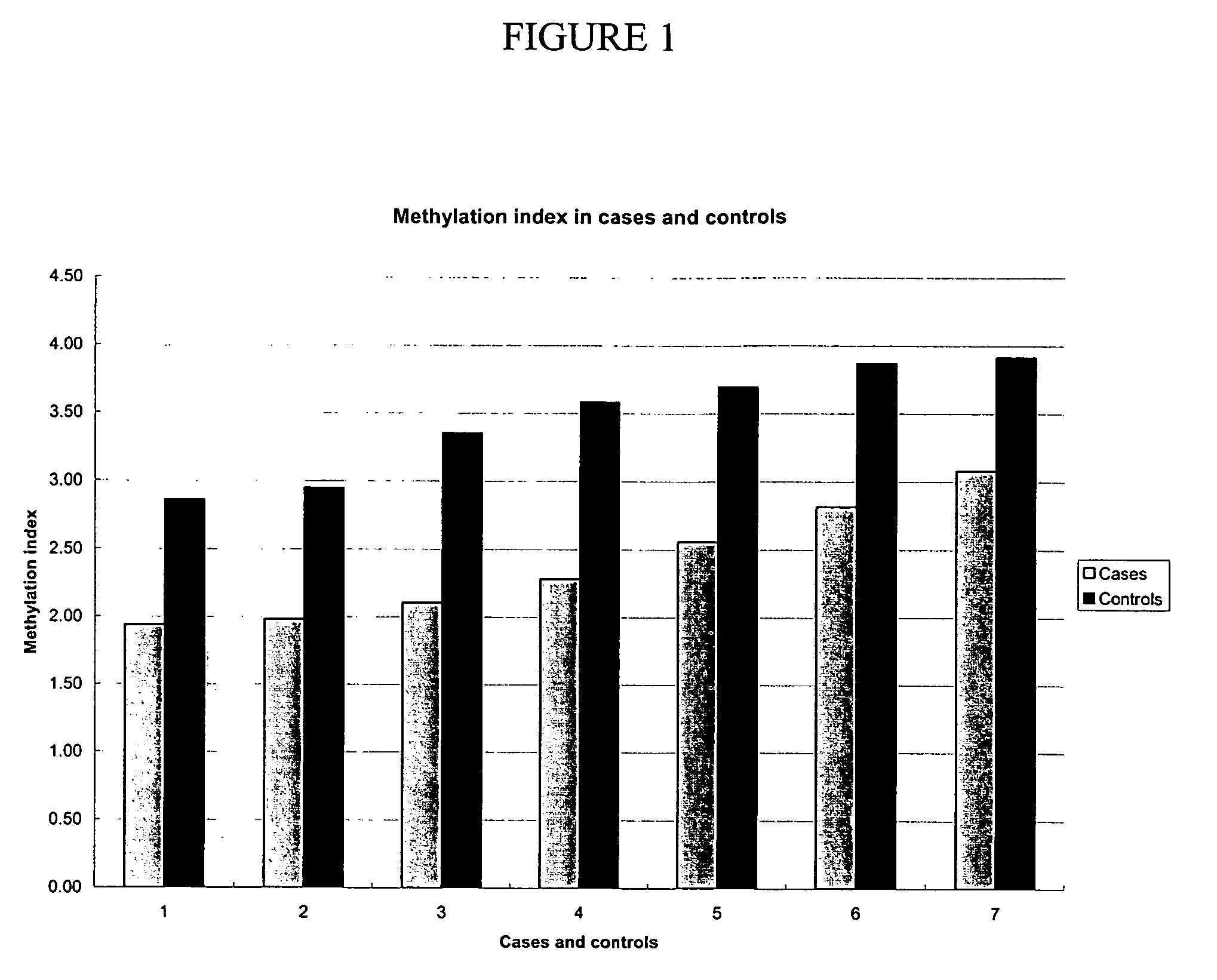Epigenetic biomarkers for early detection, therapeutic effectiveness, and relapse monitoring of cancer
a biomarker and early detection technology, applied in the field of early detection, screening and early detection methods of cancer, can solve the problems of modifying the susceptibility and risk of disease, alone may not explain the entire carcinogenesis process, etc., to improve specificity and sensitivity, reduce histone h4 acetylation, and improve the effect of specificity and sensitivity
- Summary
- Abstract
- Description
- Claims
- Application Information
AI Technical Summary
Benefits of technology
Problems solved by technology
Method used
Image
Examples
example 1
Epigenetic Biomarkers for Liver Carcinoma
[0172]Global hypomethylation is a very early event in human and experimental hepatocarcinogenesis and a feature of genomic DNA derived from solid and hematologic tumors, which may precede region-specific hypermethylation in neoplastic transformation from normal to pre-malignant phenotypes (Shen et al, 1998). Global hypomethylation in serum has been proposed as a potential prognostic marker for hepatocellular carcinoma (Tangkijvanich, 2007).
[0173]Aberrant methylation of four genes, COL1A2, IGFBP2, CTGF and fibronectin 1, has been detected in both hepatoma cell lines and primary hepatoma tissues. In addition, methylation of 5′CpG islands and histones deacetylation coexisted in the regulation of gene expression of COL1A2, IGFBP2, CTGF, but not of fibronectin 1, suggesting that both DNA methylation and histones deacetylation, occur in patterns closely associated with altered gene expression in hepatoma (Tada et al, 2005).
[0174]Hypermethylation of...
example 2
Global DNA Methylation: a Common Early Event in Oral Cancer Cases with Exposures to Environmental Carcinogens or Viral Agents
[0199]A proof-of-principle study was performed to ascertain if global DNA methylation could be a useful tool in distinguishing early molecular changes in OCP.
Method
[0200]Tissue samples from fifteen oral cavity cancer cases were collected from surgical specimens of HNSCC tissue banked at the Tumor Biology Laboratory of the University Of Puerto Rico School Of Medicine for this proof-of-principle study. Personal histories of tobacco and alcohol use were ascertained by questionnaire. HPV infection was determined by detecting HPV DNA in tumor tissue by polymerase chain reaction (PCR). DNA was extracted using standard methods. Genomic DNA samples were boiled and treated with nuclease P1 and alkaline phosphatase. Global DNA methylation levels were obtained using HPLC for fraction separation and Mass Spectrometry for quantification. 50 μl of the hydrolyzed-DNA solutio...
example 3
The Biomarkers System
[0210]The biomarker system consists of a multiplexed panel of global epigenetic biomarkers that can be used by themselves or in combination with other molecular markers of disease enabling a molecular system for early detection, clinical management and recurrence monitoring. The multiplexed panel of epigenetic biomarkers that are enabled in this invention provides a useful molecular tool to fats track the biomarker development trial system set up by the National Cancer Institute Early Detection Research Network (Pepe, 2001).
Phase 1—Preclinical Exploratory Studies
[0211]Phase 1 preclinical exploratory studies were conducted to test the epigenetic biomarker's ability to discriminate between disease and non-disease, comparing tumor tissue with non-tumor tissue as described in example 1.
Phase 2—Clinical Assay Development For Clinical Disease
[0212]Clinical assay development studies are based on a specimen that can be obtained non-invasively (e.g. blood, saliva, tears,...
PUM
 Login to View More
Login to View More Abstract
Description
Claims
Application Information
 Login to View More
Login to View More - R&D
- Intellectual Property
- Life Sciences
- Materials
- Tech Scout
- Unparalleled Data Quality
- Higher Quality Content
- 60% Fewer Hallucinations
Browse by: Latest US Patents, China's latest patents, Technical Efficacy Thesaurus, Application Domain, Technology Topic, Popular Technical Reports.
© 2025 PatSnap. All rights reserved.Legal|Privacy policy|Modern Slavery Act Transparency Statement|Sitemap|About US| Contact US: help@patsnap.com



